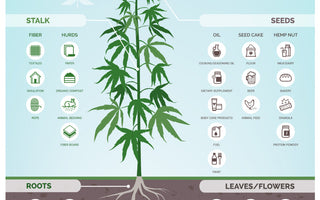In 2018, a pivotal piece of legislation known as the Farm Bill sent ripples through the United States, shaking the foundations of the cannabis industry. The passage of this bill marked a significant turning point in the perception of hemp and its derivatives, clearing the fog of confusion surrounding its legality. This article delves into the intricacies of the Farm Bill, shedding light on why hemp-derived products, including those containing THC, became legal and the implications of this groundbreaking legislation.
The Farm Bill Breakdown
The Agricultural Improvement Act of 2018, more commonly referred to as the Farm Bill, was a sweeping piece of legislation that had far-reaching implications for various aspects of agriculture in the United States. Among its numerous provisions, the one that captured significant attention was the reclassification of hemp from a controlled substance to an agricultural commodity.
Hemp vs. Marijuana: The Crucial Distinction
Central to understanding the legality of hemp-derived products is the distinction between hemp and marijuana. Both are varieties of the cannabis plant, but they possess distinct characteristics, primarily related to their chemical composition. Hemp is defined as cannabis containing no more than 0.3% delta-9 tetrahydrocannabinol (THC), the psychoactive compound responsible for the "high" associated with marijuana. In contrast, marijuana contains higher levels of THC, contributing to its psychoactive effects.
The Legalization of Hemp-Derived THC Products
The Farm Bill's most transformative impact was on hemp-derived products, particularly those containing cannabidiol (CBD) and other cannabinoids, including THC. With hemp's reclassification as an agricultural commodity, the production, distribution, and consumption of hemp-derived products became federally legal. This included products that contained THC within the legally defined limit of 0.3%. This shift opened the floodgates for a wide array of products ranging from CBD oils and edibles to topicals and tinctures, all of which gained popularity for their potential health and wellness benefits.
Why Legalize Hemp-Derived THC Products?
Several factors converged to influence the decision to legalize hemp-derived THC products:
-
Economic Potential: Hemp has a long history of use in various industries, from textiles and paper to food and construction. Legalizing hemp-derived products, including those containing THC, allowed for the cultivation of a versatile crop that could stimulate economic growth, create jobs, and support rural communities.
-
Health and Wellness: While THC is known for its psychoactive effects, it also has potential therapeutic properties. Legalization provided consumers with access to products that could offer relief from various health issues, such as pain, nausea, and muscle spasms.
-
Scientific Advancements: Growing scientific interest in cannabinoids, including THC, highlighted the need for a legal framework that allowed research and development. Legalization paved the way for rigorous scientific investigation into the potential benefits of these compounds.
-
Consumer Demand: The increasing demand for natural, alternative wellness products fueled the interest in THC-containing products. Legalization addressed consumer demand while ensuring product safety and quality.
Implications and Challenges
While the Farm Bill was a monumental step towards the acceptance of hemp-derived THC products, challenges persisted. The legal landscape remained complex, with variations in state regulations and uncertainties surrounding the FDA's stance on these products' use in food and supplements. This created a patchwork of regulations that manufacturers, retailers, and consumers needed to navigate.
Conclusion
The Farm Bill of 2018 marked a watershed moment for the hemp industry, catapulting hemp-derived products, including those containing THC, into the mainstream market. The distinction between hemp and marijuana, coupled with the recognition of hemp's economic and health-related potential, played a pivotal role in this legalization. As the legal landscape continues to evolve, the impact of this legislation reverberates not only in economic growth but in the way individuals approach health and wellness alternatives, including those involving THC.


